Semiconservative dna - Study guides, Class notes & Summaries
Looking for the best study guides, study notes and summaries about Semiconservative dna? On this page you'll find 524 study documents about Semiconservative dna.
All 524 results
Sort by
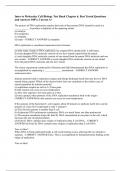 Popular
Popular
-
Intro to Molecular Cell Biology Test Bank Chapter 6, Best Tested Questions and Answers 100% Correct A+
- Exam (elaborations) • 8 pages • 2024
- Available in package deal
-
- $8.99
- 1x sold
- + learn more
The process of DNA replication requires that each of the parental DNA strands be used as a ____________ to produce a duplicate of the opposing strand. (a) catalyst (b) competitor (c) template (d) copy - CORRECT ANSWER-(c) template DNA replication is considered semiconservative because __________________________________. (a) after many rounds of DNA replication, the original DNA double helix is still intact. (b) each daughter DNA molecule consists of two new strands copied form the...
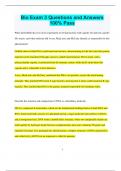
-
Bio Exam 3 Questions and Answers 100% Pass
- Exam (elaborations) • 71 pages • 2024
-
- $11.99
- + learn more
Bio Exam 3 Questions and Answers 100% Pass What did Griffith discover in his experiment involving bacteria with capsule (S) and non-capsule (R) strains, and what molecule did Avery, MacLeod, and McCarty identify as responsible for this phenomenon? Griffith observed that DNA could transform bacteria, demonstrating for the first time that genetic material can be transferred through a process called transformation. The S-strain, with a polysaccharide capsule, is protected from the immune...
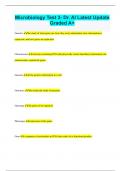
-
Microbiology Test 3- Dr. Al Latest Update Graded A+
- Exam (elaborations) • 32 pages • 2024
-
- $10.49
- + learn more
Microbiology Test 3- Dr. Al Latest Update Graded A+ Genetics the study of what genes are, how they carry information, how information is expressed, and how genes are replicated Chromosome structure containing DNA that physically carries hereditary information; the chromosomes contain the genes Genome all the genetic information in a cell Genomics the molecular study of genomes Genotype the genes of an organism Phenotype expression of the genes Gene a sequence of nucleot...
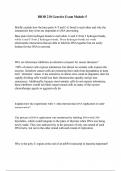
-
BIOD 210 Genetics Exam Module 5
- Exam (elaborations) • 101 pages • 2024
-
- $13.00
- + learn more
Briefly explain how the base pairs A-T and C-G bond to each other and why the interactions they form are important to DNA unwinding. Base pairs form hydrogen bonds to each other. G and C form 3 hydrogen bonds, while A and T form 2 hydrogen bonds. These hydrogen bonds are weak electrostatic interactions that are able to hold the DNA together but are easily broken for the DNA to unwind. Why are telomerase inhibitors an attractive prospect for cancer therapies? >90% of cancer cells expres...
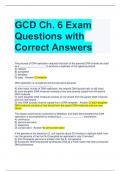
-
GCD Ch. 6 Exam Questions with Correct Answers
- Exam (elaborations) • 11 pages • 2024
- Available in package deal
-
- $12.59
- + learn more
GCD Ch. 6 Exam Questions with Correct Answers The process of DNA replication requires that each of the parental DNA strands be used as a ___________________ to produce a duplicate of the opposing strand. A) catalyst B) competitor C) template D) copy - Answer-C) template DNA replication is considered semiconservative because ____________________________. A) after many rounds of DNA replication, the original DNA double helix is still intact B) each daughter DNA molecule consists of t...
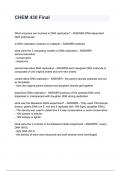
-
CHEM 430 Final questions and answers
- Exam (elaborations) • 17 pages • 2024
-
- $7.99
- + learn more
What enzymes are involved in DNA replication? - ANSWER-DNA dependent DNA polymerase is DNA replication anabolic or catabolic - ANSWER-anabolic what were the 3 competing models of DNA replication - ANSWER-- semiconservative - conservative - dispersive semiconservative DNA replication - ANSWER-each daughter DNA molecule is composed of one original strand and one new strand conservative DNA replication - ANSWER-- the parent strands separate and act as templates - then the original parent...
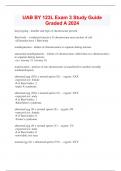
-
UAB BY 123L Exam 3 Study Guide Graded A 2024
- Exam (elaborations) • 20 pages • 2024
-
- $14.99
- + learn more
karyotyping - number and type of chromosome present Barr body - -condensed inactive X chromosome near nucleus of cell -all females have 1 Barr body nondisjunction - failure of chromosomes to separate during meiosis autosomal nondisjunction - -failure of chromosomes (other than sex chromosomes) to separate during meiosis -exs: trisomy 21, trisomy 18 translocation - portion of one chromosome is transferred to another (usually nonhomologous) abnormal egg (XX) x normal sperm (X) - -...
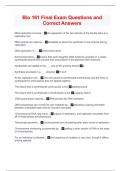
-
Bio 161 Final Exam Questions and Correct Answers
- Exam (elaborations) • 19 pages • 2024
- Available in package deal
-
- $11.49
- + learn more
DNA replication involves... the separation of the two strands of the double helix at a replication fork DNA strands are used as... templates to direct the synthesis of new strands during replication DNA replication is___ semiconservative Semiconservative... means that each daughter DNA molecule consists of: a newly synthesized strand and a strand that was present in the parental DNA molecule. Nucleotides are added to the ___ end of the growing strand 3' Synthesis proceeds in a ___ directio...
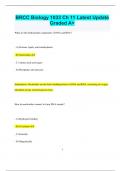
-
BRCC Biology 1033 Ch 11 Latest Update Graded A+
- Exam (elaborations) • 6 pages • 2024
- Available in package deal
-
- $9.99
- + learn more
BRCC Biology 1033 Ch 11 Latest Update Graded A+ What are the fundamental components of DNA and RNA? - A) Proteins, lipids, and carbohydrates - B) Nucleotides - C) Amino acids and sugars - D) Phosphates and enzymes Explanation: Nucleotides are the basic building blocks of DNA and RNA, consisting of a sugar, phosphate group, and nitrogenous base. How do nucleotides connect to form DNA strands? - A) Hydrogen bonding - B) Covalently - C) Ionically - D) Magentically 2 ...
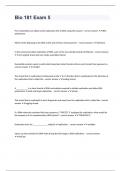
-
Bio 181 Exam 5 questions n answers graded A+
- Exam (elaborations) • 11 pages • 2024
- Available in package deal
-
- $15.99
- + learn more
Bio 181 Exam 5Free nucleotides are added at the replication fork of DNA using the enzyme - correct answer DNA polymerase Which of the following is the DNA at the end of linear chromosomes? - correct answer telomere In the semiconservative replication of DNA, each of the new double strands of DNA has - correct answer one original strand and one newly assembled strand Nucleotide excision repair is particularly important when thymine dimers are formed from exposure to - correct answer UV l...

How did he do that? By selling his study resources on Stuvia. Try it yourself! Discover all about earning on Stuvia


